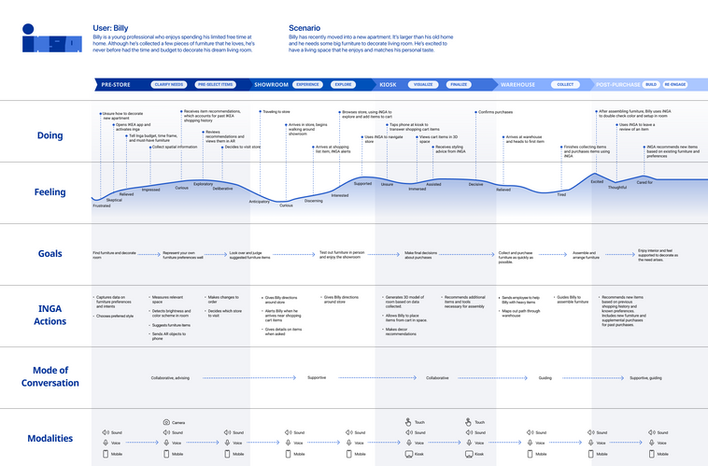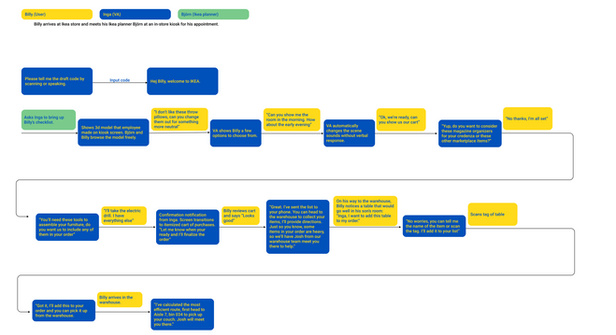
A virtual assistant design aiding home furnishing and online/offline shopping experience through UI/UX Research
Inga
2021
CONTEXT
MPS/MDes IxD Studio
Carnegie Mellon University
Fall 2021 (8 Weeks)
TEAM
Yeonjin Park
Jonah Conlin
Priyanka Goel
Shih-Hsueh Wang
Advised by Professors Kyuha Shim and Dina El-Zanafy
ROLES
Brand Research
Conceptual Ideation
Voice Research
UI Design (Kiosk Interface)
3D Modeling and Rendering
Video Production
TOOLS
Figma
Procreate
Rhino
Vray for Rhino
Premiere Pro
Play.ht (AI Voice)
OVERVIEW
Virtual Assistants (VA) have been broadly applied to our day-to-day life for decades, such as chatbots on websites or any software agent that carries out tasks given by users. Significantly, all of them are based on dialogue systems. Voice User Interface (VUI) that can be added to VA utilizes sound-based modality transformed from dialogues to enhance user experiences. The use of VUIs provides solutions for situations when typing or reading is not possible. Furthermore, combined with AI, VA such as Apple Siri or Google Assistant can act like a real person to complete tasks based on personalized needs.
Since Virtual Assistants aim to be as real-person assistants as possible, however, emotional caring is one of the parts that VA design is supposed to achieve, instead of emphasizing task-oriented function as in the past. Thus, our team intended to explore the possibility of more natural interactions between users and a conversational VA and more engaging user experiences for both customers and the brand.
CONCEPT VIDEO
Design Objectives -
Design a multimodal virtual assistant to merge experiences in IKEA from Planning, In-Store Shopping, to Post-Purchase.
-
Unite Digital Tools
Inga unifies Ikea’s suite of digital tools, helping customers navigate their Ikea experience online and in person
-
Expand Planning Service
Inga gives every customer the experience of a personal Ikea planner, a service typically reserved for major remodels.
-
Improve Engagement
As Inga learns about customers taste, it can make targeted recommendations from Ikea’s evolving product line.
Problem Statement -
How might the voice assistant augment the walk-in experience rather than replacing offline experience with the convenience of remote shopping?
Experience Design -
To Create a Holistic Experience for the Users and a Sustainable Market to the Brand
Audience: Design and Price Conscious Customers, and New Homeowners

Plan it. Or ask for suggestions.
Users use Inga to get recommendations on Ikea furniture that would work in their space. Inga asks users a few critical questions about existing furniture, budget, taste. She also assists in measuring room layout and lighting to recommend items for users' shopping lists.

While shopping, learn some fun facts about the design you like.
After arriving at the store, Inga directs users to the showroom section that contains each item on their shopping list. While users try out the products, Inga provides the story behind the Scandinavian design on the item.


We are excited to share our ideas in support of your design. Take a look!
At the end of the showroom, Inga guides users to kiosks to see their pre-design in 2D layout and 3D simulations according to their measurement at home. Inga in kiosks provides immersive visual and sound embodiment to help users make decisions. Also, help customers prepare for installation and budget control.

Need a hand? We are always here.
When customers step into the warehouse, Inga maps out the smoothest path to get items. She also arranges an employee to assist them if there are heavy items or multiple parts for a single product to pick up.

How are things? We got new designs, and you'll love them.
Based on the data Inga has collected about a customer's taste and room style, the App offers targeted suggestions that match their taste with Ikea's evolving product line.
Design Process -
1. Exploratory Research
To have an initial concept of Voice User Interface and to understand our client - IKEA, we conducted a series of analyses. We started by researching how Google Assistant works with smart lighting systems to figure out the workflow.
VUI Case study
In terms of brand research, we mapped out IKEA's threats and opportunities, which inspired us to take merging the trending online shopping to walk-in experience as a whole. Plus, IKEA is not just a furniture seller, but a leader bringing better life at home. They had been observing modern human life's changes and publishing catalogs to document the transformation for 70 years.
The analysis also found that IKEA, especially in Asia and Europe, has been further pushing and evolving its outstanding offline experience to compete with the fastness and convenience of online shopping. Therefore, it could be an opportunity to propel the hybrid experience for US IKEA.
Brand Analysis
Insights
Though the interview with IKEA employees and customers, we found out some common points and summarized up in three insights:
-
The in-store experience, particularly the showrooms, are a significant part of Ikea’s value proposition for customers.
-
For larger projects, such as a kitchen renovation, Ikea’s employees work closely with customers to design and develop precisely the products that fit their needs.
-
The process of locating furniture in the warehouse that a customer found in the showroom can be cumbersome and time consuming.
2. Defining Objectives & Ideation
Objectives
Concerning IKEA's mission to make quality furniture and interior design easy, affordable, and fun, in addition to solving current inefficiencies such as confusing furniture locations and shortage of stock, our team wanted to push the design further in enhancing engaging experiences. Therefore, the challenge we defined would be:
Persona
-
Targeted User:
Billy is a young professional who enjoys spending his limited free time at home. Although he’s collected a few pieces of furniture that he loves, he’s never before had the time and budget to decorate his dream living room.
-
Virtual Assistant:
Inga is proactive for addressing anticipatory issues for both employees and customers. She is also a decision facilitator for clarifying customers' needs and tastes. Through long-term cooperation, Inga becomes more knowledgeable about customers' preferences to help building a sustainable relationship between customers and Ikea
In order to delineate the personality of Inga, we carried out research on tone of voice, language, and speech pace through an AI voice generator (Play.ht). We tested different types of voices to figure out the best match to the brand image, interaction pattern, and our expectations. We finally decided Inga be creative, playful, and friendly to support users in shopping accompanying and pairing up furniture with her taste as a designer.

Inga Personality Sliders
Interaction Process
To aid the walk-in experience, we wanted to include the entire IKEA experience, such as before and after visiting stores, to reveal how fun and enjoyable it could be in the store. Our team divided the IKEA customer experience into pre-store, in-store, and post-store phases, then ideated every possible interaction between users, the mobile phone, and the kiosk by storyboarding.
Storyboard
User Journey
After converging the ideas through storyboarding, we organized the entire experience and summarized what the user feels with the corresponding interactions at every phase with the voice assistant in multimodalities.

User Journey Map
Form and Motion
After we defined the personality of the virtual assistant, we kept iterating what Inga looks like and how Inga moves in different states. We tried abstract and geometric shapes, morphing from the IKEA man, and ended up with personified letters that were straightforward, clear, and connected to the brand.

VUI State Ideation
Final Set of Inga Motion States (Motion Design by Jonah Collin)
Welcome
Introduces Inga to new users in a fun and visually engaging way.
Processing
Signals that Inga is processing a user request
Notification
Attracts attention for an announcement that requires user attention
Celebration
An infrequently used animation which celebrates the user completing a major task, just as assembling a piece of furniture.
Speaking
Indicates that Inga is addressing the user
Listening
Shows recognition that the user is addressing by Inga
Confirmation
Signals that Inga has completed a user request
Idle
Signals that Inga remains ready to assist
Visual Design
According to the brand research, we wanted to maintain the brand identity of IKEA by using the same palette of blue and yellow colors. We further developed the secondary colors in lighter and darker blue based on these two primary colors. As for the red, considering the form and motion of the notification state, we chose red colors to attract users' attention.
Color Scheme
To respond to IKEA's image of fun, quirky, stacking, and assembling, we played with the letters of "inga," inspired by IKEA's logo, by making them embedded with each other and piling upon one by one in motion state.
Icon Design
3. Prototyping
Conversation User Interface
While prototyping the user interface on devices, we also developed the dialogues at each phase, locating the possible conversation between the user and IKEA's virtual assistant. We adjusted the interface by referring to the dialogues, and vice versa revised the conversation by the updated interface.
Dialogue Flow
Screen Prototyping
Established from the refined storyboard and VUI Design, we began iterating the interface on both mobile phone and kiosk screens. In the beginning, we made all the interactions triggered by voices and sounds. However, we found out that sometimes using touch as the mean of interaction was more reasonable and intuitive, such as picking items shown as pictures on screens. Besides, the kiosk interface played a significant role in the in-store experience, where customers could receive IKEA's design advice and immersive feedbacks in 3D simulation and sound effects to revise their design on the spot.
Kiosk UI Design





































